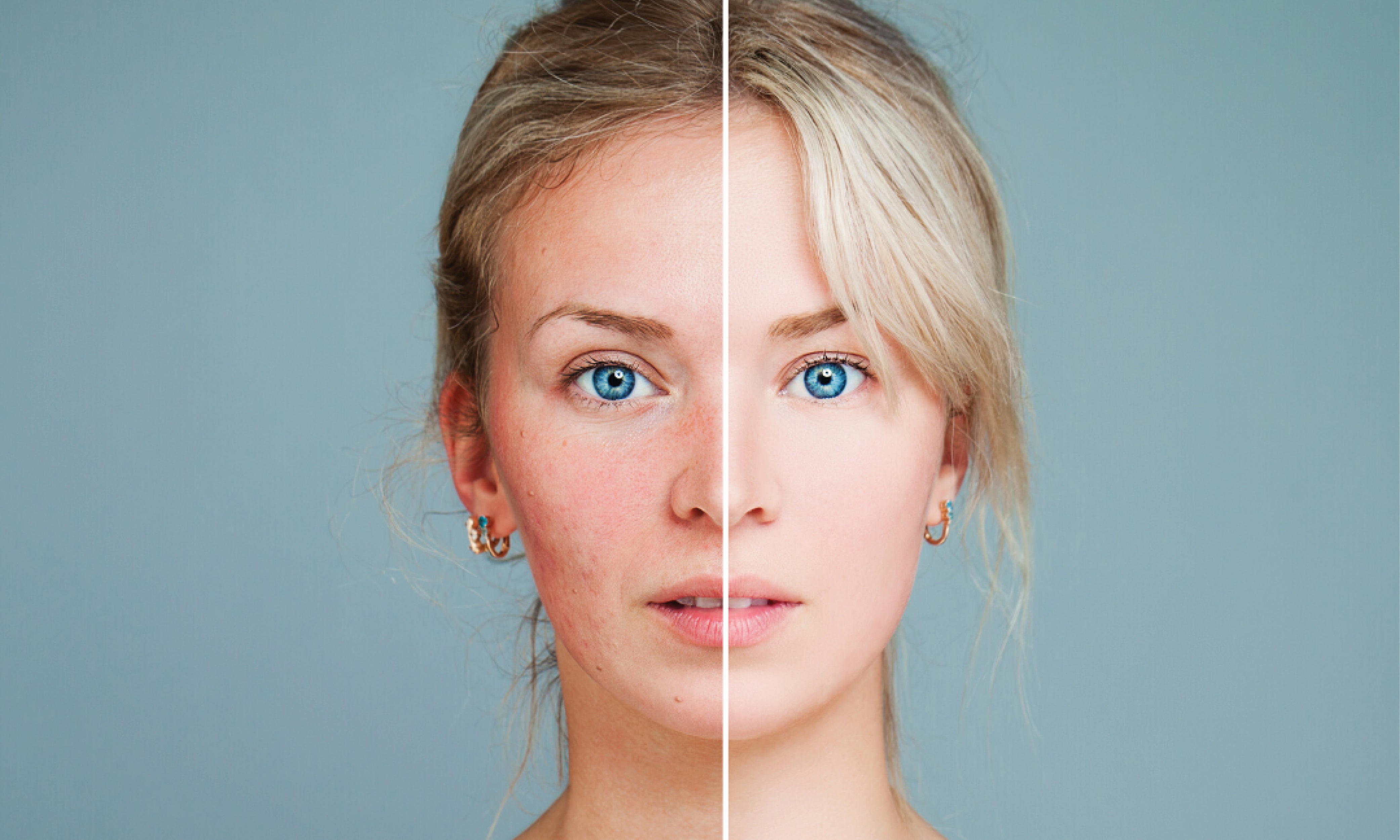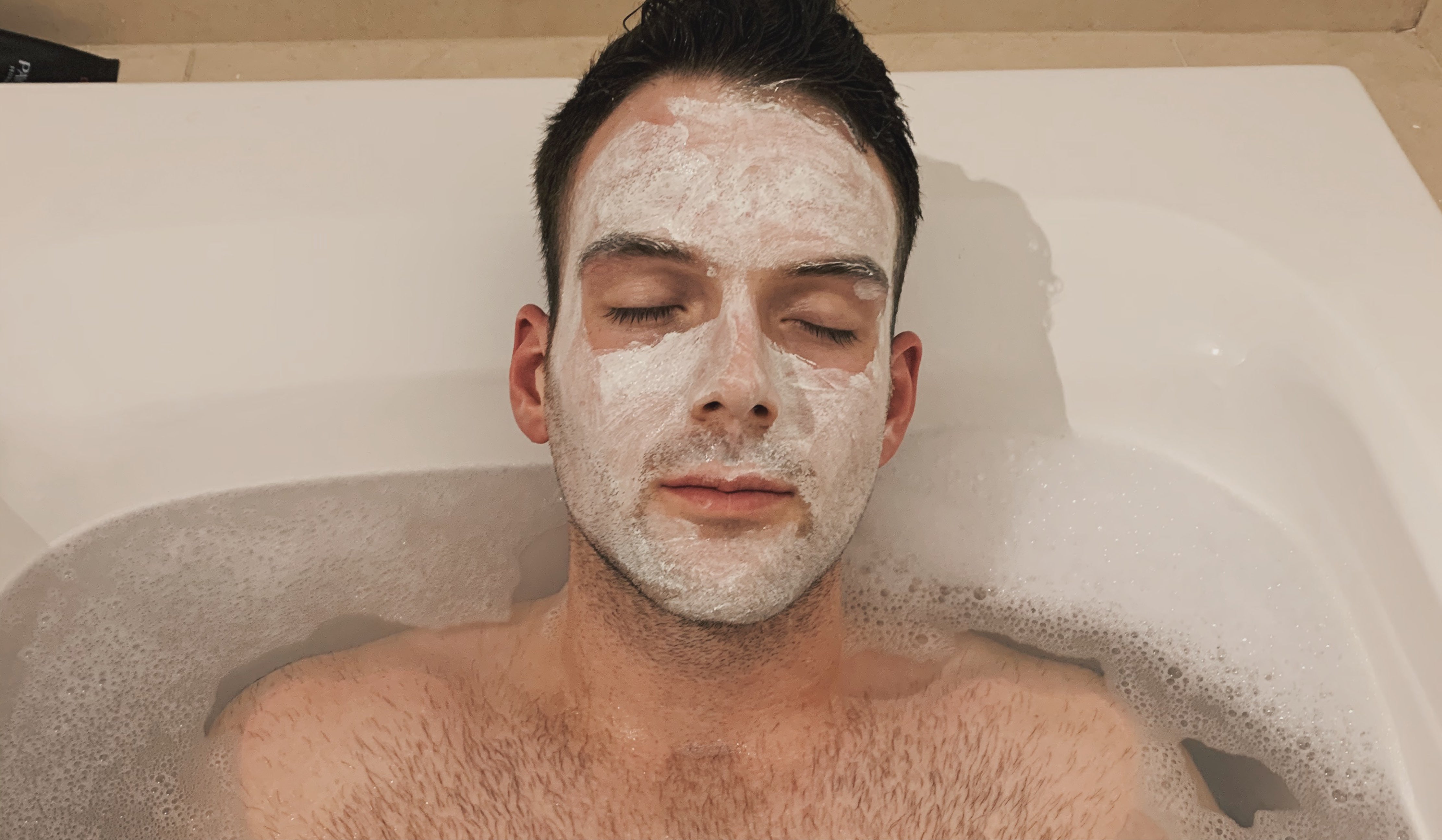
ROSACEA FAQ’S.
ROSACEA (roe-ZAY-she-uh) is a common chronic skin condition that causes irregular facial flushing, that can become permanent over time. Rosacea is identified by redness and visible (broken) blood vessels in the face. It can also produce small, red, pus-filled bumps, swelling, inflamed and irritated eyes, dry patches and in some severe cases a thickening of the skin. These symptoms can flare up for weeks to months and then go away (subside) for a period of time. People suffering from Rosacea often have the majority redness in the center of their faces, which can be accompanied by very sensitive skin. In most cases, these people cannot tolerate regular skincare products and need to use products formulated for this specific condition.
There is no current cure for Rosacea, however, awareness and treatment can help to manage, control and reduce triggers and symptoms. Although Rosacea can affect anyone, it is most common in:
- Women over the age of 30
- Light (fair) skin types
- Sun-damaged skin
- Smokers
- Those with a family history of Rosacea
TRIGGERS: The exact cause of Rosacea is unknown, however, it is believed to be a combination of hereditary and environmental factors. Rosacea is not caused by poor hygiene. There are a number of factors that have been known to stimulate flare ups, including:
- Spicy foods (chili pepper, jalapeños, hot sauce and tabasco pepper);
- Cinnamaldehyde foods (cinnamon, tomatoes, citrus fruits, chocolate);
- High-histamine foods (tomatoes, pineapple, strawberries, papaya, red plums, eggplant, spinach, mushrooms, shellfish, legumes, fermented foods (aged cheese);
- Wine and alcohol (hard liquor, champagne, bourbon, gin, vodka, beer);
- Hot drinks (tea, coffee, hot cider and hot cocoa);
- Medications (niacin (vitamin B-3), sympathomimetics (blood pressure drugs), topical steroids);
- Temperature extremes (hot or cold);
- Sunlight or wind;
- Emotions (stress, anxiety, lack of sleep, grief);
- Exercise;
- Drugs that dilate blood vessels (blood pressure medications);
- Some skin care/makeup products.
SYMPTOMS: There are a variety of Rosacea symptoms, including:
- Facial redness (AKA Subtype 1 - Erythematotelangiectatic): this is the most common type and what most people identify as Rosacea. It produces flushing, broken blood vessels and persistent redness which is most commonly located in the center of the face. Blood vessels on the nose and cheeks can become swollen and more visible.
- Swollen red bumps (AKA Subtype 2 - Papulopustular/Rosacea Acne): Most people who start with facial redness (Subtype 1) develop pimples on their face that look like acne. These bumps may contain pus and the skin may feel tender, sensitive, itchy and hot.
- Enlarged nose (AKA Subtype 3 - Rhinophyma/Phymatous): In extreme rare cases and over a period of years, Rosacea can cause the skin on the nose to thicken appearing bulbous. This is most common in men.
- Eye problems (AKA Subtype 4 - Ocular Rosacea): Another common symptom that accompanies Rosacea is dry, irritated and swollen eyes (including red and swollen eyelids). Sometimes eye problems are the first symptom experienced, before the skin.
WHAT DOES ROSACEA FEEL LIKE? A sunburn or heat rash that can throb, sting, feel dry, tight and itchy.
IS THERE A CURE FOR ROSACEA? There is no known cure. Rosacea is a progressive condition that worsens over time if untreated, therefore, the best way to deal with it is through diagnosis by a Dermatologist followed by managing, controlling and eliminating all triggers. There are some oral medications available to help manage flare-ups and gentle IPL laser treatments have been proven helpful for some people. Over time, the more stressed the skin becomes the more prone it will be to flare ups. This causes the capillaries to weaken, becoming much more visible; resulting in permanent skin redness.
CAN DIET HELP ROSACEA? Yes, however, there is no conclusive evidence. Here are a few dietary tips to help reduce flare-ups:
- Nutritional supplements: that contain healthy fat may help reduce Rosacea and/or soothe dry, gritty eyes:
- Omega-3 Fatty Acids
- Zinc Sulfate
- Foods to balance the gut: there is some evidence which indicates that Rosacea can be triggered by an imbalance of microorganisms that live in our gut and on our skin. Foods that help promote good bacteria (fibre-rich, prebiotics and probiotics) may help to reduce symptoms:
- Probiotic foods: yogurt, sauerkraut, kefir, miso, tempeh, kimchi, kombucha, pickles;
- Prebiotic foods: bananas, onions, leeks, asparagus, garlic, chicory root, dandelion greens, Jerusalem artichoke;Whole grains: oats, barley, amaranth, sprouted wheat.
- Other insights: Some people have reported that eating vegan and removing dairy, gluten and sugar from their diet has helped manage symptoms and triggers.
Dietary choices can help reduce Rosacea flare-ups, as certain food stimulates inflammation and dilates blood vessels. It’s important to note that triggers vary in severity from one person to the next, therefore, it’s highly recommended to log what you eat (and drink) to observe and note any changes in flare ups. It may take time and paying close attention to your skin, to understand which foods to eat and which foods to avoid. It’s important to determine what triggers you. Remove and add foods one step at a time to see how your skin responds. Always refer to a Doctor, Dietician and/or Nutritionist to ensure your diet is balanced and remains healthy.
SKINCARE AND ROSACEA: As Rosacea varies in severity from one person to the next, there are no specific product miracles that have been defined as a complete solution. Things to consider when choosing products are:
- Read ingredients and choose products that are gentle and specific to Rosacea (sensitive skin). Most professional skincare brands offer products related to this concern.
- If you are trying something new, do a patch test to see how your skin reacts. Most brands offer samples that can be helpful in finding the right solution for you. Ingredients such as AHA (i.e. Glycolic Acid), BHA’s (i.e. Salicylic Acid), Tea Tree Oil, Witch Hazel, Alcohol, Menthol, Fragrance, Retinol (Vitamin A) and Vitamin C are known as triggers for many people.
- Be gentle with your skin and don’t use anything that is aggressive, like granular exfoliators or brushes.
- Avoid using water directly on your face when you're in the middle of a flare up.
- As temperature fluctuation can trigger flare ups, avoid direct hot and cold water..
- Be cautious as many people with Rosacea initially assume they have acne and treat it accordingly. Acne products are absolutely terrible for Rosacea and can make it much worse.
- Mineral (physical) sunscreen (broad-spectrum SPF30 to SPF50) is an absolute must during the day, when you suffer from Rosacea. Chemical sunscreens are not recommended because they turn UV rays to heat, which is a no-no for Rosacea.
- It’s recommended to use natural mineral-based makeup products (foundation, powders) for covering Rosacea. One of our personal favourites is Oxygenetix and products from GLO Skin Health (makeup).
HOW TO BOOST SELF CONFIDENCE: Although Rosacea is not a life-threatening condition it can have a profound impact on one’s emotional well-being, health and self confidence. It’s estimated that over 75% of people suffering from Rosacea have low self-esteem, low self confidence and it interferes with socializing, personal relationships and career advancement. The reason for such an important impact on one's life is because it’s vulnerable to flare ups, is visible and impacts one’s appearance. This is largely linked to control and managing the triggers.
Here are a few tips to manage this condition:
- Do your own research and get educated on Rosacea;
- Know and understand what your personal Rosacea triggers are;
- Learn what skincare and makeup products work for you. Use cover up foundations (powders) that your skin can tolerate, to camouflage redness;
- If you feel it is required, seek counsel from a psychologist/psychiatrist.
Rosacea absolutely loves routine, as such, discovering what works for you and managing it every day is your key to success. To start, it’s a process of patience, trial and error before getting it right - and even then, you may need to tweak and adjust your routine for different reasons. If you need advice and/or product suggestions, it would be our pleasure to assist you. Please feel free to reach out to us at info@bskinenvie.ca.
Rosacea doesn’t mean an end to your social and professional self. Get control of it so that you can get back on track, enjoying your life to the maximum!
Tasch xxx











Leave a comment